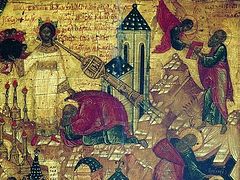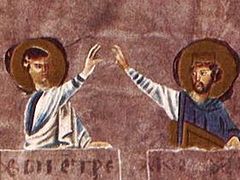Source: Notes on Arab Orthodoxy
November 30, 2016
There are certain erroneous or distorted beliefs that are widespread among the faithful. In this brief note, I am concerned with the one that starts out from the basis of the Bible to erroneously state that the face of God in the Old Testament is not the same as in the New Testament. Some believe that God in the Old Testament is only a god of war, cruelty, violence and racism, while in the New Testament, He is only a god of love, forgiveness, mercy and kindness.
This erroneous belief is the result either out of ignorance of the Old Testament, its interpretation and its structure or under the influence of misconceptions similar to the approach of those critics of the Bible who attack it for reasons too numerous to refute here. In each case, the approach to the bible is wrong because it is not a theological approach to a religious book. Many also arrive at erroneous conclusions because they do not understand the essence of inspiration in Christianity or because they take a merely historical approach to the Bible.
In Christianity, divine inspiration has taken place over the course of a long pedagogical relationship of about eighteen and a half centuries. God inspired humankind with what He wanted to say through the historical events that they experienced, speaking to them in their language and according to their understanding, gradually bringing them toward Him. The Bible is not a book of history, even though it uses history to speak theology.
By way of example and not exclusively, I will cite some verses of the Old Testament where God's face appears merciful, loving and forgiving:
"And the Lord passed before him and proclaimed, 'The Lord, the Lord God, merciful and gracious, longsuffering, and abounding in goodness and truth, keeping mercy for thousands, forgiving iniquity and transgression and sin...'" (Exodus 34:6-7, see also Numbers 14:18, Deuteronomy 4:31, Psalm 86:5 and 108:4, Joel 2:13).
God says, "I drew them with gentle cords, with bands of love... I will not execute the fierceness of My anger... For I am God, and not man, the Holy One in your midst; and I will not come with terror" (Hosea 11:4 and 9).
"... But You are God, ready to pardon, gracious and merciful, slow to anger, abundant in kindness, and did not forsake them" (Nehemiah 9:17).
"The Lord is gracious and full of compassion,slow to anger and great in mercy. The Lord is good to all, and His tender mercies are over all His works" (Psalm 145:8-9).
And some verses of the New Testament show another face:
"Now out of His mouth goes a sharp sword, that with it He should strike the nations. And He Himself will rule them with a rod of iron. He Himself treads the winepress of the fierceness and wrath of Almighty God" (Revelation 19:13-15).
"Then the king said to the servants, ‘Bind him hand and foot, take him away, and cast him into outer darkness; there will be weeping and gnashing of teeth’" (Matthew 22:13).
"For the wrath of God is revealed from heaven against all ungodliness and unrighteousness of men, who suppress the truth in unrighteousness" (Romans 1:18).
Christ says, "Depart from Me, you cursed, into the everlasting fire prepared for the devil and his angels..." (Matthew 25:41).
"But woe to you, scribes and Pharisees, hypocrites" (Matthew 23:13).
These verses, and many others besides in both testaments, show us that relying on an individual verse in isolation from its context leads to misunderstanding, very often completely contrary to its intended meaning. Scriptural inspiration was first of all inspiration in action and not in writing. God intervened in the lives of people and then a group first of all. He set their life straight. He educated them. He disciplined them. He changed their way of thinking, revealing Himself to them to the degree that they could bear His light until inspiration reached its apex with total divine disclosure in the person of Jesus Christ. "The Word became flesh and dwelt among us..." (John 1:14).
God incarnate spent around thirty-three years on our earth teaching, preaching, guiding, saving and fulfilling the dispensation of salvation completely. He did not leave us a single sheet of paper written by His hand. Rather, He sent the Holy Spirit to His apostles and His Church. He inspired some of them to preserve in writing what He taught them by word and deed.
The writers of the Bible in both its testaments read their experience with God and came to understand it by the Holy Spirit not at the time of its happening, but afterwards, then they learned God's intent and transmitted it to the faithful people.
How many times did Christ rebuke His disciples with harsh words because they did not understand what He meant?
God is the same in both testaments. His true image becomes clear in his accompanying sinful humankind until they reach the point of abandoning sin. Some find fault with the existence of sinful people-- and what human is without sin?!-- who played an important role in the history of salvation but they forget that God accompanies sinners in order to save them from their sin and has mercy on them with longsuffering until they repent and change. Dwelling on the sins that appear in the stories of people in the Bible is not important. The important thing is focusing on the grace that changes and transforms these sinners.
God has undertaken-- and continues to undertake-- the task of saving humankind. The Bible came into existence for their salvation because they languished under sin and were enslaved to the devil.
It is also necessary to pay active attention to reading the texts, especially the Old Testament, in a manner consonant with its genre. That is, not reading narratives, poetry, stories, proverbs and wisdom literature all in the same way. Rather, give each genre its due. Poetry is not direct speech like explicit commandments are.
It is likewise very necessary to know that in the Old Testament especially, history was the theater that God used to discipline humankind and to show them gradually through its events His pure divine image until it was completed in their eyes. The Bible very often uses historical events to give a religious-- that is, theological-- lesson.
Here is an example. The Book of Judges speaks of people playing an important role in trying times. It magnifies some of them, such as Samson, and attributes superhuman characteristics to them. All of this is with the intent of making it clear that God's hand, when it intervenes, reigns over all other powers. As for the theology intended by the recounting of events and wars that the judges waged, whether they really waged them as it appears or as it was preserved in the popular memory, it is the following:
When the people sins toward God, they break the covenant and God abandons them, handing them over to their enemies.The people become aware of their error and cry out to God, repenting and confessing, so God sends them a judge to save them from the oppression that has befallen them.
God is a father and a pedagogue. He is a lover and a judge. He is just and forgiving. He is kind and disciplines. He is powerful and tender. Does education not requires firmness and intensity, suppleness and tenderness? To the degree that a person is course and crude and cruel, he benefits from firmness, just as he benefits from sternness. Love is God's essence. His power is the power of love.
As for the superficial teaching that is popular among us, which focuses only on mercy, love and forgiveness, it is incomplete because it does away with the teaching and rebuking face of God who accompanies humankind until they reach the desired ideal.
Education's reliance in the past on fear, violence and punishment and its excessive use of this style does not mean that the correct manner of education today should ignore other aspects, such as judgment, justice and good or evil deeds casting man and all creation into heaven or hell.
May he who realizes his sins, is pained by them and sincerely walks in the way of repentance understand the meaning of the Bible and the essence of God's word and may he have constant nourishment.







